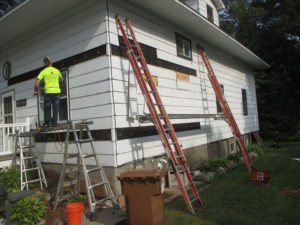It says blow in insulation side walls yes it doesn t say anything about the plugs but it also doesn t say anything about removing the siding.
Plug blown in insulation holes in aluminum siding.
Repairing drywall holes after blown in cellulose insulation application duration.
Sand the corners of the area you cut and lightly sand an area of about 1 inch on both sides the top and bottom of the gap.
The hole is then.
The less you have to cut the better.
Take the x acto knife and cut out the portion of the aluminum siding that contains the large hole.
Once the caulk is fully cured which could be several days depending on the type trim it even with the siding with a razor blade.
Cut a portion of the intact siding material to match the piece you just cut out.
Blown in insulation can also be installed from the interior but similar holes made in the drywall must be plugged patched sanded and painted.
Use with one inch drill bit.
Place plugs into holes after cavities have been filled with greenfiber insulation.
Collectively as experts do the blown insulation they in lots of circumstances drill holes in the siding at distinctive heights then blow it in by utilizing way of the holes they have plastic plugs.
When installed properly rigid foam insulation creates a barrier.
However from the exterior it creates large unsightly holes that must be plugged sanded and painted to try and match the rest of the siding.
What i am wondering is if the customer is correct or not and if we should be plugging the holes or if the aluminum siding and tight cellulose is enough protection for the 2 holes between every stud.
The best way to insulate aluminum siding is to install rigid foam insulation on the exterior of the home before adding the siding.
Whilst experts do the blown insulation they in many circumstances drill holes in the siding at distinctive heights then blow it in via the holes they have plastic plugs that they put in to cap the.
To install blown in insulation in existing walls holes are drilled at the top of each stud space usually on the exterior and material is blown in via a long flexible hose.
Sidewall insulation retrofit applications require drilled holes in either the exterior sheathing or interior drywall.
After careful inspection and preparation of the walls one inch holes are drilled.










